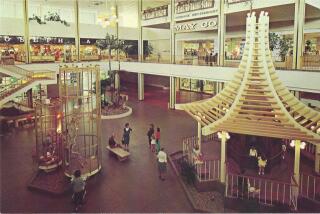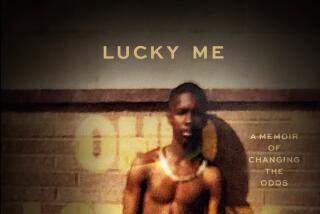Men’s Store Stays Before TV Camera Eye With Giveaway Policy
- Share via
As the owner of a Sherman Oaks men’s clothing store, Rick Pallack sells millions in merchandise every year.
But, when he’s dealing with Hollywood, he also gives a lot away. Pallack is one of a handful of retailers who regularly swap clothes for production credits. His name has rolled up the screen at the end of KABC-TV’s “Eye on L.A.,” the 1985 film “To Live and Die in L.A.” and other productions.
Pallack’s ties to the entertainment industry don’t end there. At age 30, he’s already a leader among the local clothiers catering to celebrities, wardrobers and others associated with Hollywood.
Although such customers account for only about 20% of his sales, they’ve given Pallack and his shop, known simply as Rick Pallack, a show business image. In turn, Pallack uses that to attract other status-conscious customers and to develop interest in his own designer line.
Pallack, who sports a dark tan and favors double-breasted suits, drops the names of celebrity customers such as television personalities Pat Sajak of “Wheel of Fortune” and Tony Danza of “Who’s the Boss?”
“I went to the Emmys and it made me happy to see the people I dressed looked very nice,” Pallack said last week.
Competitors Envy Success
Pallack’s competitors say they envy his success in promoting his business.
“I only hope everyone will eventually know Bill Francis as well as they do Rick Pallack,” said Francis, who owns Eric Ross & Co., a clothing store in Encino that caters to the entertainment business.
Tony Fiorito, a Los Angeles-based costumer for the ABC television network, said: “Every time a suit winds up looking good on some performer’s body on some show, it’s another item sold for Rick Pallack.”
Pallack got started in sales as a youngster. When he was 9, he says, he designed cuff links by gluing two buttons together and sold them to about a dozen retailers at $2.30 a pair, making 50 cents on each sale.
“I know him from when he was a little boy, and he’s never known anything but clothes,” said Jules J. Kaplan, president of Academy Award Clothes, a retailer in downtown Los Angeles. “It’s in his blood.”
Pallack was barely out of Nestle Elementary School in Tarzana when he took his first job, as a stock boy at Mike Howard menswear store in Beverly Hills. At 14, he went to work for Marty Rudnick, whose tony Beverly Hills boutique, Rudnick’s, then had an outlet in Encino.
Sold Close-Out Shirts
But Pallack wasn’t satisfied with just hourly wages. During his off hours from Rudnick’s and Taft High School, he bought shirts at manufacturers’ close-outs, then sold them out of his old Dodge to friends.
When he was 17, Pallack says, he moved the business from the back of his car to an apartment and began to support himself. He later spent three semesters studying business at Los Angeles Pierce College before dropping out to devote himself full time to his clothing business.
Pallack sold quality designer-name clothes, buying from manufacturers at a discount by paying cash. One of his advertising slogans at the time was: “Would you change in my bathroom to save $200?”
Business apparently was successful. By the time Pallack was 23, he had purchased the house where he still lives in Sherman Oaks, as well as a Mercedes-Benz and a Ferrari.
In 1981, Pallack bought the former medical office building on Sherman Oaks Avenue, south of Ventura Boulevard, where he now keeps his store and offices.
Since then, annual sales have grown from somewhat more than $1 million to more than $5 million, despite the store’s relatively scant 2,000 square feet of retail space. Richard B. Pallack Inc., as the business is formally known, employs 40, about half of whom are sales personnel.
Word-of-Mouth Promotion
Pallack discovered early the cachet of dealing with celebrities, a segment of his business that he says was nurtured mostly by word of mouth. In the early days, Pallack would lock the apartment door when celebrities came in, and would give them all his attention.
With big-name shoppers more commonplace now, customers can make appointments to see Pallack’s staff, but the store doesn’t casually close in the middle of the day. Pallack says about 10% of his sales are to celebrities and others associated with the entertainment business who do their personal shopping at his store.
Another 10% of the store’s sales, he says, are to Hollywood wardrobers, who sometimes spend as much as $7,000 on a single visit. Pallack says he seeks business with wardrobers because it gets exposure for his clothes, even if he has to surrender control over details such as which jacket is matched with which pair of trousers.
When Pallack gives away clothes to get production credits, he has more influence over those decisions. Calling the credit arrangements “inexpensive advertising,” Pallack says that most of the deals are cheaper for him than a minute of local television advertising. But he says he turns down a lot of offers for screen credits.
“There’s a point at which such deals are no longer cost-effective,” he said, without disclosing what the arrangements typically cost him.
Pallack is one of the few retailers to cut credit deals. More frequently, the studios work out their arrangements with clothing manufacturers such as Botany 500 and Pierre Cardin.
Over the past five years, Pallack’s store has emphasized his own private-label merchandise.
The reason goes beyond ego; Pallack says he long had the problem of getting quality clothes from manufacturers, which often don’t want their merchandise discounted. By contracting with about 100 factories to produce designs to his specifications, Pallack now cuts out the middlemen and can sell at any price he wants.
Pallack readily acknowledges that his designs aren’t very original, saying he is following the trend of updating classic looks. In his simple office above the store, Pallack works at a big table, penciling sketches that are slight variations on popular designs.
For example, Pallack might have a manufacturer make a conservative two-button suit out of a solid gray material, and then add a subtle lavender pinstripe. Or, on a plain white dress shirt, he might include some extra detail such as a tab collar.
Comparisons Difficult
Because the clothes are private label, it is difficult to compare prices, but wardrobers say Pallack’s prices are competitive with those of department stores. Suits run from $200 to $500, shirts sell for $20 to $100, and sweaters are from $30 to $300. Styles range from conservative to trendy, but are rarely outlandish.
Pallack likes to coordinate complete outfits, rather than just sell parts, so he lays out ensembles on tables around the selling floor. Aside from being able to make more money by selling handkerchiefs, shoes and ties with suits, Pallack says most men need help getting dressed.
“Unlike women, most men don’t usually think complete outfits when they shop, so we help them,” Pallack said.
Pallack says that’s partly why he prefers keeping the store exclusively for men. He says his plans include replacing his existing store with one on an acre he bought two years ago on Ventura Boulevard in Sherman Oaks.
In the meantime, Pallack wants to get more creative with his designs.
“I’m not trying to be in the Paris fashion shows or to be the next Yves St. Laurent,” Pallack said. “But I want to design things not otherwise available in the marketplace.”
More to Read
The biggest entertainment stories
Get our big stories about Hollywood, film, television, music, arts, culture and more right in your inbox as soon as they publish.
You may occasionally receive promotional content from the Los Angeles Times.










